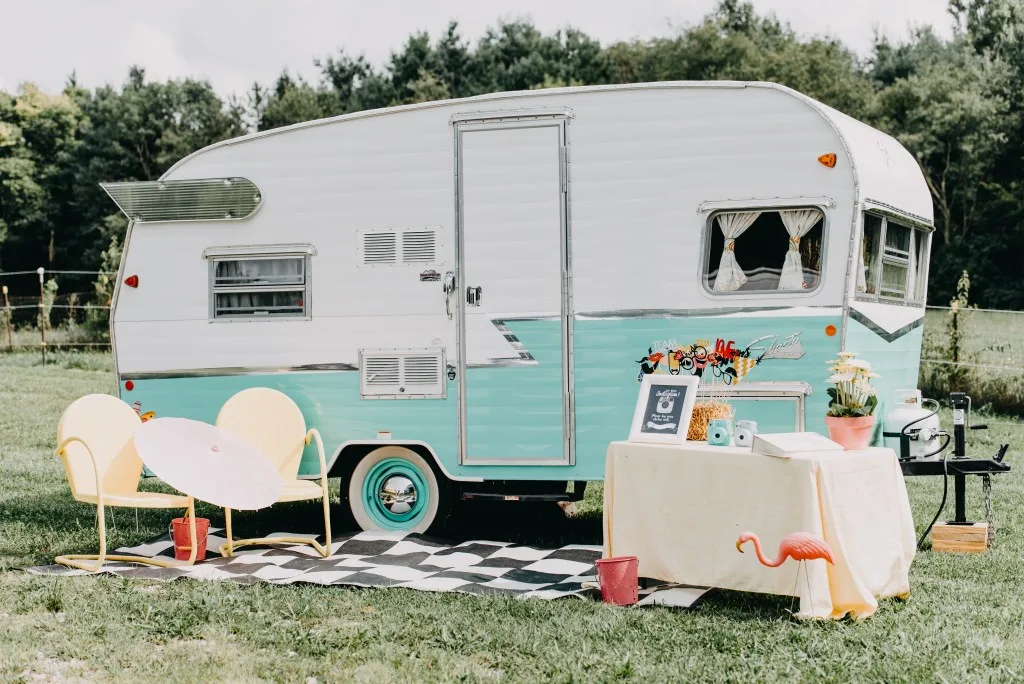One of the most controversial rules in the RV community is the 10-year rule.
Whether you agree with it or not, it’s an inevitable part of camping in some campgrounds and RV parks. With the popularity of vintage campers growing, is the RV 10-year rule disappearing?
Let’s take a look!
What Is the 10-Year RV Rule?
The 10-year RV rule is a rule in many RV parks and high-end private campgrounds that prohibits the use of RVs older than 10 years. Enforcement of the 10-year rule can be hit or miss, so it’s essential to check any campground or RV park’s rules before making a reservation.
Some RV parks will even ask to see the vehicle registration for any RVs they might suspect of being too old.
It doesn’t matter whether you’re driving a Class A motorhome or a travel trailer; this rule doesn’t discriminate.
Many RV parks and campgrounds enforce this rule across the board for all RVs.
Do All RV Parks Have the 10-Year Rule?
Not all RV parks have the 10-year rule, but it’s not uncommon. You could travel across the entire country in your 10+-year-old RV, and there’s a good chance that you won’t have any issues finding a spot.
This is especially true if your camping style doesn’t lend itself to luxury-filled campgrounds. If you’re looking for a standard RV park or campground, you’re not likely to have any issues with the 10-year rule.
However, try to stay in a luxurious or expensive RV park, and you’re more likely to encounter this rule.
Pro Tip: Do you have an older RV? Don’t get turned away from a campsite with these 5 Ways Around the RV 10 Year Rule.

Does KOA Have a 10-Year Rule?
There are more than 500 KOA campgrounds across North America. However, these campgrounds are independently owned and operated.
This means that each KOA writes its own rules and regulations. So while there’s no KOA corporate policy regarding the 10-year RV rule, some could enforce it.
If you’re planning to stay at a KOA, it’s a good idea to jump on the campground’s website and look for a list of rules and regulations. You can also call the campground and ask the front desk.
The Benefits of the RV 10-Year Rule
While the 10-year rule can be annoying for some, there are certain circumstances where it’s beneficial. RVs typically don’t age well, and shortly after the 10-year mark, RVs start to show their age. This often creates an undesirable-looking RV with peeling or faded decals and less than stellar paint.
However, the 10-year rule is about more than just aesthetics. The older an RV gets, the more likely it will break down. Oil and other liquid leaks can cause permanent damage to the pavement and leave behind a mess at the end of your stay.
Speaking of leaks, an older propane system is also more likely to fail.
A propane leak can be dangerous for the RV owners and the entire campground or RV park. So the 10-year rule keeps everyone safe, and that’s reason enough for many campgrounds to enforce it.

The Disadvantages of the RV 10-Year Rule
There has been a growing trend in recent years to remodel older RVs. Many DIY enthusiasts purchase older RVs in relatively decent condition and then remodel them.
They’ll do a complete overhaul of the RV that’s not only Instagram-worthy but completely functional for full-time RV living. Even though these RVs look better than some younger RVs, they would get denied.
Vintage campers like Airstreams can last an incredibly long time. Airstream estimates that nearly 70% of all the Airstreams they’ve ever made are still on the road today. Despite this, the 10-year rule would bar these RVs from many campgrounds.
Pro Tip: Vintage campers are cute, but they’re not always practical. These are 5 Reasons to Avoid Vintage Campers.
Why Do RV Parks Not Allow Older RVs?
Older RVs are an extreme liability for campgrounds. They’re more prone to breaking down and malfunctioning. This could mean that a campground is stuck with a broken RV that can’t vacate a camping spot.
Some RV parks pride themselves on their lawn care and pristine landscaping. These parks are typically expensive and look more like a Disney theme park than a campground.
Beat-up old RVs are not what their clientele wants to see pulling in and parking next to them. They’re paying big bucks to stay at their site, and they expect a certain level of luxury.

How Many Years Do RVs Last?
How long an RV lasts will vary greatly and depends somewhat on how well the owners take care of it. An RV will likely last anywhere from 10 to 20 years with proper maintenance. RVs usually don’t hide their age very well without a remodel.
Usually, as an RV approaches the 10-year mark, decals will begin to crack or peel and paint will fade. This reflects how the owners stored the RV and where the rig spent most of its time. If an RV sat outside in the harsh desert sun for an entire summer, it would show its age more.
Many of the essential systems in an RV will begin to break down with age too. Motorized RVs are more likely to experience leaks and or have engine failures. Staying up to date on all maintenance is essential for the longevity of any RV.
Will the RV 10-Year Rule Disappear?
The RV 10-year rule likely isn’t going anywhere.
Locations that enforce this rule are doing so to maintain a certain atmosphere in their parks and campgrounds. If they’re charging high-end prices, their guests are expecting luxury amenities.
So don’t hold your breath waiting for this rule to disappear anytime soon.
Have you ever been rejected by an RV park or campground because your RV is 10-years-old or older? Tell us about it in the comments below!
Discover the Best Free Camping Across the USA
To be honest with you, we hate paying for camping. There are so many free campsites in America (with complete privacy).
You should give it a try!
As a matter of fact, these free campsites are yours. Every time you pay federal taxes, you’re contributing to these lands.
Become a FREE CAMPING INSIDER and join the 100,000 campers that love to score the best site!
We’ll send you the 50 Best Free Campsites in the USA (one per state). Access the list by submitting your email below:
I don’t mind the 10 year rule. Helps me to know which parks to bypass to avoid the snobier RV crowd. I am happy to stay at a state or federal park or boondocking over any park that has an age restriction on RVs (even though mine makes the cut) or an age restriction on people.